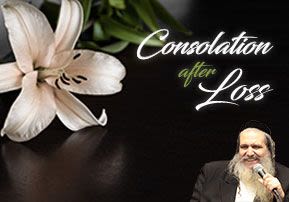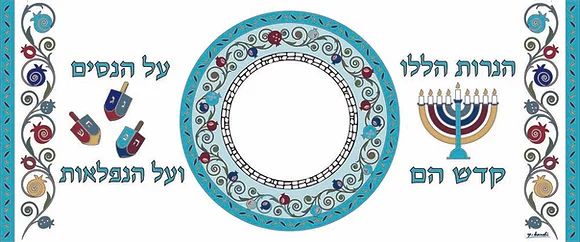
Consolation after Loss
It’s a difficult topic, but it’s even more difficult to cope without knowing how to fill the gaping hole...

This week, I want to touch on something very emotional, but at the same time, something every single person in the entire world needs. It's a topic that is a little difficult to speak about, but it is even more difficult if we don’t read and learn about it. This article can save a lot of people from emotional scars and deep suffering.
It should be Hashem’s will that very soon and in our days the verse should be realized: “and death shall be cut off forever” and we should never hear any more bad news. In the meantime, there is no one in the world who has not faced, or is facing, or will face loss. Therefore, every single one of us without exception must learn what is nechama – consolation – and how do we console others.
Loss could mean the death of a close relative or even a child (it should never happen to us), losing a limb or losing one’s eyesight. It could also mean losing a job, or a loss due to a fire, or any other form of loss. The connecting thread is that without proper consolation, a person can break into pieces without the ability to recover, G-d forbid, as we all have seen and heard about before.
The Most Difficult Loss
Let’s take for example, the loss of a child G-d forbid. The parents mourn and are totally broken with a huge hole in their lives. People come and go, each attempting to comfort them – but where is the consolation? Is there someone or something that can fill the gaping hole?
At its most simple, “consolation” is turning the wheel backwards to the way life was before the loss – returning to a whole and normal life. The mourning is caused by the deficiency– therefore, the only real way to turn the wheel backwards and find real consolation is to fill the hole. Therefore, how can we ask these parents to be comforted, when no one can bring their child back to life?

Here comes Rebbe Nachman, the Great Consoler, who explains something new and foundational: The essential aspect of consolation is daat (pronounced dah–at) – holy knowledge. In saying daat, the intention is complete emuna – emuna shleima. When a person reaches this level of complete knowledge and total emuna, then all of the losses and holes are filled. Hence the phrase, “If you have acquired daat – what do you lack?”
However, this still begs the question: If nothing can bring the child back to his parents, then how do we fill their deficiency with daat?
The Daat Shows that there is No Lacking
As I just explained, mourning comes from a deep sense of lacking. We thought that this child would live many more years and bring much more pride to his parents and teachers, to succeed in life and raise his own family, and all of this was cut off with his passing. Therefore, it seems to us that there is a huge gaping hole that cannot be filled.
But daat tells us that G-d, Creator of all souls, sends souls into this world for a rectification and a mission. When a soul finishes its mission, it leaves this world. Therefore, from the view of daat, there is no lacking whatsoever. The child didn’t lose anything; in fact, just the opposite is true – the child is now the most whole. He finished his mission and his purpose.
So, let’s explain again according to this understanding – We cannot bring the child back, but the deep sense of loss can be filled with the knowledge and understanding that there really isn’t a deficiency here at all. Therefore, true and complete consolation comes when there is no longer a feeling of loss.
This is very difficult. Consolation is a long process which requires a lot of work. It doesn’t come in one  moment. Hashem should never send such situations to anyone. But this is the truth, and the only consolation there really is. We must understand the proper outlook of emuna, because this is the only way to return to a fulfilled life after any loss. There just isn’t any other way.
moment. Hashem should never send such situations to anyone. But this is the truth, and the only consolation there really is. We must understand the proper outlook of emuna, because this is the only way to return to a fulfilled life after any loss. There just isn’t any other way.
I Don’t Have Anything and I Don’t Lack Anything
This is true for every form of loss and deficiency in life, because daat tells us that hidden within the loss lies the completeness.
A couple came to me who had been extremely wealthy and lost all their money. In the aftermath, they merited to start learning emuna and thanking Hashem. They said to me, “We are grateful that Hashem took all our money. He took our money and gave us emuna, and enabled us to come closer to Him. We used to have money, but we were so totally lacking. Now we have nothing, but we also lack nothing…”
Hashem saw that this couple could only come to their wholeness and their purpose specifically through this “loss” – so we see that it was specifically the loss which brought them to their completion.
This is exactly what I wrote in The Garden of Emuna regarding anyone who has a handicap or other deformity G-d forbid – the only true consolation is the knowledge that this deficiency is specifically their completeness. Hashem in His wisdom and compassion knew that only like this could the person reach their perfection – which is knowing Hashem and creating a personal relationship with Him.
Without emuna, everything breaks and crushes a person. You don’t have to even experience such a difficult loss. I recently heard about a wealthy and successful man whose dog died, and he could no longer function. Rebbe Nachman teaches in Rebbe Nachman's Wisdom: “Someone who doesn’t have emuna, his life is not life at all. As soon as something bad happens to him, he has no life inside of him. He has no way to comfort himself at all, because he has no emuna…”
Console, Console My People
This is also true of the Jewish people. This week, we mourned the destruction of the Holy Temple. This is no small loss; this is the biggest and most consequential loss possible for the Jewish people. And here we are, already being consoled: “Nachamu, nachamu ami” – “Be consoled, be consoled, my people…” It’s true that this is a seven-week process. But how is this process even happening, when the Holy Temple is still in ruins, and the wound is still raw and bleeding?
The answer here is also daat: After the fact, our completion now is to serve Hashem specifically in exile and in a state of seeming “loss.” Even though we are commanded to mourn the destruction every single day and at every single wedding – we also need to believe that this current situation is the best thing that could possibly be for us. We must serve Hashem happily in this situation exactly.
There are No Punishments and No Curses
This is true for every “punishment” in history. For example, after the Sin of the Spies, the Jewish people were punished with 40 years in the desert. This is not about brutality and vengeance. Hashem knew that 40 years in the desert would give the Jewish people the best conditions under which to rectify their sin and its root cause. The sin was a deficiency, and the Jewish people had to fix it, which is to arrive at their perfection. This process required specific conditions, which in this case, was 40 years in the desert.
We can go back even farther, to the “curses” given to Adam, including death which came to the world because of his sin. These are the new conditions he needed to reach his perfection in his new state after the sin – and these are the best conditions that could possibly be for us today as well, in order to reach our purpose and perfection.
The very first rectification that we can do is simply to recognize this truth and accept it with love, and thank Hashem for every difficulty, and all the suffering, and every “loss.” This is especially important in our generation, which is filled with suffering, darkness and the exile of daat. We could easily live with a constant feeling of heavy and paralyzing loss. But Hashem wants you to be consoled – which means to strengthen ourselves to learn and truly live the daat that there really is no loss and no deficiency at all! And that our situation today, with all its suffering, is the very best thing for us in order to rectify ourselves and be redeemed, and arrive to our wholeness individually and collectively.
It should be Hashem’s will that everyone should have complete daat and complete emuna, and accept everything that Hashem does to us with love without feeling any loss, deficiency, or pain – and we should merit to arrive at our wholeness and true perfection, and to the total consolation with the Redemption, it should be soon and in our days.











Tell us what you think!
Thank you for your comment!
It will be published after approval by the Editor.